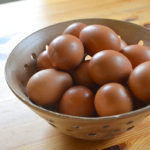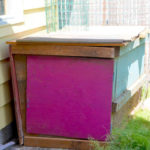I like to do an annual deep cleaning of my chicken coop – sometimes every twice a year. Things were getting a bit smelly despite my weekly raking out of the used bedding and replacing with fresh straw. After such a wet season, I am actually considering changing my bedding material to pine shavings instead. I hear they stay drier. The problem with straw is that once it’s wet, it really never dries.
I noticed Maude’s bottom was dirty, which made me really bummed out. I was worried there might be something wrong with her. I took the opportunity to handle each of my hens and look them over closely for signs of pests or issues. Everyone appeared in good health. I think the wet conditions have just left them with little options for places to take a dust bath.
The girls got to free-range all day in the backyard, busily gobbling up slugs, snails and my vegetable garden. They found some nice, dry places to take baths. There activities outside the coop allowed me ample room to thoroughly rake out all the bedding and remove everything from the coop – feed container, waterer, the nesting boxes and roost bar. I then sprayed everything down with a strong hose and scrubbed out all the caked on spots inside the hen house.
Vinegar acts as an anti-bacterial agent and comes in really handy for all kinds of cleaning projects. I used a spray bottle filled with white vinegar to spray down the walls, roost and nesting boxes in the hen house. I then doused the floor of the hen house with vinegar and scrubbed it really well. Everything was then allowed to dry for the rest of the day.
 The feed and water containers were washed thoroughly inside with warm, soapy water. When I refilled the water, I added about a teaspoon of apple cider vinegar. I have read over the years many reports from chicken-keepers that they think it contributes to overall poultry health. It also keeps algae from forming in my water container, which is nice.
The feed and water containers were washed thoroughly inside with warm, soapy water. When I refilled the water, I added about a teaspoon of apple cider vinegar. I have read over the years many reports from chicken-keepers that they think it contributes to overall poultry health. It also keeps algae from forming in my water container, which is nice.
The grit and oyster shell containers were both refilled. The feeder was stocked. Once dry, the nesting boxes and roost bar went back in the hen house. Everything got filled, a little thicker this time, with fluffy clean straw. At the end of the day, there were three happy, clean chickens in their coop.








 This has become my
This has become my
 This is from South
This is from South


 All the ornamental grasses get cu
All the ornamental grasses get cu



It is our first year with chickens and we just cleaned out the coop this weekend too. Finally enjoying some nice sunny weather. They all seem happy in the newly cleaned & fluffed coop & run!
Thanks for the tip on cleaning with apple cider vinegar. I normally strip my coop every month but with the wet weather things are a little more damp than normal and need a little disinfecting.
You might also want to look into rice hulls as an alternative to pine shavings (or straw). They do stay dry, absorb moisture, and have the added benefit of being small enough to pass through a kitty litter scoop. I run a scoop through my hen house every couple of days. It only take a minute and keeps the coop cleaner and smelling better for a longer period of time.
Thanks for the tip Melissa. Kathy, I use white distilled vinegar for the coop cleaning and apple cider vinegar in their water.
My partner’s pretty keen to get chickens into the yard – but Im not sure our two dogs will welcome chooks as long term guests. However, I’m getting alot of preparatory research through the blogosphere – thanks heaps for this informative post.
This is very fascinating, You are an overly professional blogger. I’ve joined your feed and look ahead to searching for extra of your fantastic post. Also, I have shared your website in my social networks